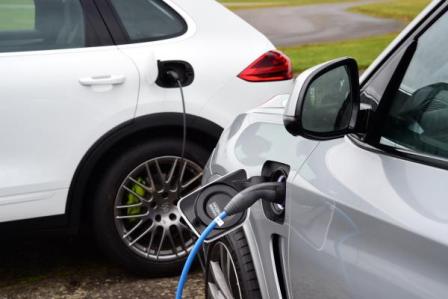Something strange is happening. Car manufacturers are issuing a flood of plug-in hybrid cars. You are spoiled for choice with Mini, BMW, Skoda, Volvo, Porsche, Mercedes and others joining in.
[dropcap]T[/dropcap]he fundamentals are all against them. Those offering the most desirable pure electric cars – those with the longest range and three times the resale value – have long waiting lists but they will catch up. No long wait for a plug-in hybrid. GM abandoned its Volt plug-in hybrid. Many users report two types of range anxiety: a small battery and a small gas tank. The UK withdrew PHEV support because people never plugged them in, benefitting the environment, not at all. Consequently, although plug-in hybrid sales have been rising, their market share has been dropping since 2013 (IDTechEx and BNEF).
 Dr Peter Harrop led the IDTechEx team producing the new report, “Electric Vehicles 2020-2030” with EV forecasts in 100 categories. He says “Traditional automotive companies wish to keep the internal combustion engine going for a bit longer.
Dr Peter Harrop led the IDTechEx team producing the new report, “Electric Vehicles 2020-2030” with EV forecasts in 100 categories. He says “Traditional automotive companies wish to keep the internal combustion engine going for a bit longer.
Many have revealed how far they are behind Tesla in pure electric by bringing out what are essentially copies of Tesla powertrains from six years ago but not all. Hyundai Kia, for example, has one-year waiting lists for its excellent pure-electric cars. They will clear that delay, releasing pent-up demand. Others will rapidly copy that success.“
“Well-funded start-ups go straight to pure electric. Tesla Roadster will have 1000 kilometres range matching gasoline: it will then become commonplace. Those buying internal combustion vehicles hope the city and country bans will not apply to hybrids, but they face increasing range anxiety from the number of gas stations plummeting – down 90% in the UK in recent years for example as charging stations increase. They have financial anxiety from dropping resale values.”
Harrop concludes, “There is absolutely nothing to reverse dropping market share for plug-in hybrids leading to decline in sales numbers. Indeed, with new inputs, we have just revised our forecasts down to show plug-in car sales at zero in 2030. Technologically they are becalmed while pure-electric is evolving fast – from camper mode to solar versions that never plug in.”



